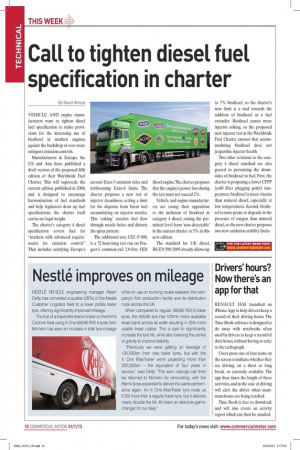Call to tighten diesel fuel specification in charter
Page 8

If you've noticed an error in this article please click here to report it so we can fix it.
y David Wilco., VEHICLE AND engine manufacturers want to tighten diesel fuel specification to make provisions for the increasing use of biodiesel in modern engines, against the backdrop of ever more stringent emission controls.
Manufacturers in Europe, the US and Asia have published a draft version of the proposed fifth edition of their Worldwide Fuel Charter. This will supersede the current edition, published in 2006, and is designed to encourage harmonisation of fuel standards and help legislators draw up fuel specifications; the charter itself carries no legal weight.
The charter's category 4 diesel specification covers fuel for "markets with advanced requirements for emission control." That includes satisfying Europe's current Euro-5 emission rules and forthcoming Euro-6 limits. The charter proposes a new test of injector cleanliness, setting a limit for the deposits from burnt fuel accumulating on injector nozzles. This 'coking' restricts fuel flow through nozzle holes and distorts the spray pattern.
The additional test, CEC-F-098, is a 72-hour-long test run on Peugeot's common-rail 2.0-litre HDi diesel engine. The charter proposes that the engine's power loss during the test must not exceed 2%.
Vehicle and engine manufacturers are easing their opposition to the inclusion of biodiesel in category 4 diesel, raising the permitted level from 'non-detectable' in the current charter to 5% in this new edition.
The standard for UK diesel, BS EN 590:2009 already allows up to 7% biodiesel, so the charter's new limit is a nod towards the addition of biodiesel as a fuel extender. Biodiesel causes more injector coking, so the proposed new injector test in the Worldwide Fuel Charter ensures that accommodating biodiesel does not jeopardise injector health.
Two other revisions to the category 4 diesel standard are also geared to preventing the downsides of biodiesel in fuel. First, the charter is proposing a lower CFPP (cold filter plugging point) temperature; biodiesel is more viscous than mineral diesel, especially at low temperatures. Second, biodiesel is more prone to degrade in the presence of oxygen than mineral diesel, so the new charter proposes two new oxidation stability limits.







































